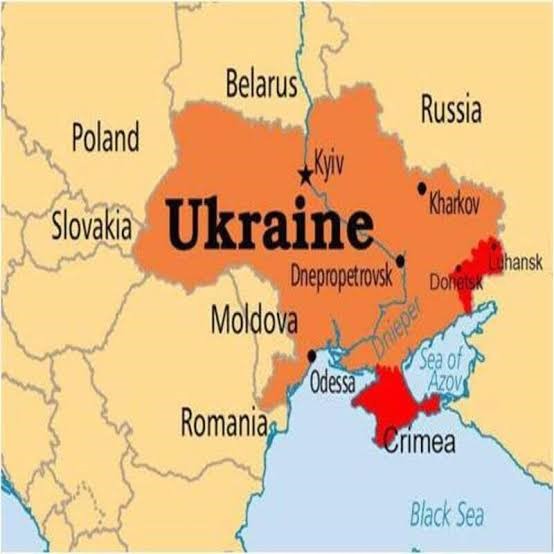Ahmedabad
(Head Office)Address : 506, 3rd EYE THREE (III), Opp. Induben Khakhrawala, Girish Cold Drink Cross Road, CG Road, Navrangpura, Ahmedabad, 380009.
Mobile : 8469231587 / 9586028957
Telephone : 079-40098991
E-mail: dics.upsc@gmail.com

Positing India’s stand on Ukraine war
News: Recently, UNGA adopted a resolution, calling for an end to the war. The resolution was favoured by 141 members and opposed by seven, while 32 states abstained. India was one among the 32.
What is India’s stand?
India has refused to condemn Russia for the invasion
It has refused to join the West’s sanctions
It has stepped up buying Russian fuel at a discounted price, and has consistently abstained from UN votes on the war.
What is West’s viewpoint on Ukraine war?
For U.S. President (as Simon Tisdall argued in The Guardian: This is a global crusade for democracy. He called the Russian invasion “a test for the ages”
For the Atlanticists the war by an authoritarian Russia on a “democratic” Ukraine is an affront to global democracy. According to this narrative, anything less than a complete Russian defeat would mean “the end of the international order”.
To save global democracy, the rules based order and international law, all democratic states should take a position against Russia and join the western coalition.
Is this a battle between democracies and autocracies?
An overwhelming majority of nations have supported UNGA resolutions calling for the war to be brought to an end.
The U.S. has hardly managed to mobilize democracies outside its traditional western alliance system against Russia.
India and South Africa, large democracies from Asia and Africa, have consistently abstained from votes at the UN and refused to join the sanctions
The sanctions were unilateral, imposed by specific countries or blocs, without UN approval.
Brazil, the largest democracy in South America, has not joined the sanctions and so have many smaller democracies (and non-democracies) across geographies.
Other countries that are part of the western alliance system, for example Israel and Turkey, are reluctant to join the US’s crusade.
Why western claims of morality in the Ukraine war seem to be dubious?
There is no doubt here that Russia has violated the sovereignty of Ukraine. Russia’s annexation of Ukrainian territories is a clear violation of international laws.
But a key dilemma before any country in international relations is clash between moral positions and national interests.
For the U.S. and much of Europe, there is a convergence of their moral positions and foreign policy objectives in the case of the Ukraine war. The U.S. wants to “weaken” Russia. So, the moral line they take serves their strategic purpose.
However, this position was violated when there were clashes between values and interests.
For example, in 2003, the U.S. launched its illegal invasion of Iraq, violating the country’s sovereignty. In 2011, NATO turned a UNSC resolution to establish a no fly zone in Libya into a full scale invasion. Right now, the U.S. has illegally placed its troops in Syria.
Israel has illegally annexed East Jerusalem and Syria’s Golan Heights. The U.S. has recognized Israel’s annexation of Golan and moved its embassy to Jerusalem.
Why our ties with Russia are important?
From the perspective of meeting energy needs and energy security the Discounted fuel from Russia is a relief for India. It meets over 80% of its fuel needs through imports.
Defence ties are also important, Russia has fulfilled over 46% of India’s defence needs in the last five years. There is a sound argument that India should diversify its source of defence imports, but such a change would take time.
Russia is deepening relations with China and for our own strategic interests in the region and our relations with China, maintaining relations with Russia is important.
To manage its continental interests, India has to work with powers in the Eurasian landmass. The U.S. is practically absent, especially after its disastrous withdrawal from Afghanistan. Russia plays a key role in India’s continental foreign policy.
Way Forward
Neither the weakening of Russia nor the destruction and splintering of Ukraine is in its interests. India wants an immediate end to the war.
A new security equilibrium between great powers is needed so that the global economy could be stabilized The world could focus on more pressing problems — from climate change to UN reforms.
India should stick to its pragmatic neutrality, rooted in realism. It should continue to push for a practical solution to the Ukraine crisis.

Address : 506, 3rd EYE THREE (III), Opp. Induben Khakhrawala, Girish Cold Drink Cross Road, CG Road, Navrangpura, Ahmedabad, 380009.
Mobile : 8469231587 / 9586028957
Telephone : 079-40098991
E-mail: dics.upsc@gmail.com
Address: A-306, The Landmark, Urjanagar-1, Opp. Spicy Street, Kudasan – Por Road, Kudasan, Gandhinagar – 382421
Mobile : 9723832444 / 9723932444
E-mail: dics.gnagar@gmail.com
Address: 2nd Floor, 9 Shivali Society, L&T Circle, opp. Ratri Bazar, Karelibaugh, Vadodara, 390018
Mobile : 9725692037 / 9725692054
E-mail: dics.vadodara@gmail.com
Address: 403, Raj Victoria, Opp. Pal Walkway, Near Galaxy Circle, Pal, Surat-394510
Mobile : 8401031583 / 8401031587
E-mail: dics.surat@gmail.com
Address: 303,305 K 158 Complex Above Magson, Sindhubhavan Road Ahmedabad-380059
Mobile : 9974751177 / 8469231587
E-mail: dicssbr@gmail.com
Address: 57/17, 2nd Floor, Old Rajinder Nagar Market, Bada Bazaar Marg, Delhi-60
Mobile : 9104830862 / 9104830865
E-mail: dics.newdelhi@gmail.com